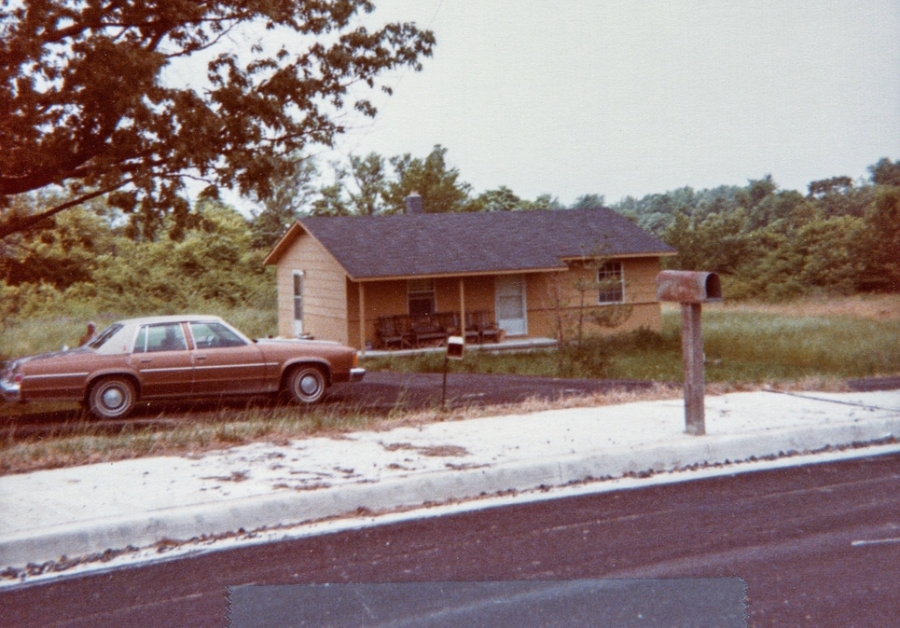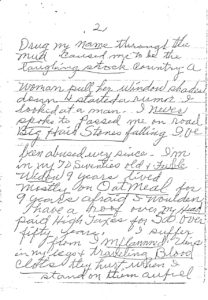Author’s Note: some factual details, Mary’s letter, and photos (scanned from the originals) in this article were mined from an unpublished case study I co-authored; my foggy, unofficial recollections form the rest of the story. For all dollar figures, keep in mind that a buck in 1978 would be equivalent to about $4.47 in 2022.
The curious offset bypassing a building on the road construction plans didn’t bode well for our team at the Tennessee Department of Transportation’s regional office in Chattanooga. The house, located in a small town perched on a mountain plateau in East Tennessee, was in the proposed right-of-way. The ornery owner had threatened the hapless surveyors with “bodily harm” if they came on her property—now she was our problem. Jerry, Chief Property Manager, assigned the relocation to me, a lowly Property Manager I at the bottom of the pecking order.
Jerry dealt me the short straw, but, to his credit, he had my back and partnered with me in the travails that followed. Jerry was bald, except for a scruffy crown of brownish hair, with eyes magnified by 70s-style goggle glasses. He had debarked a load of pounds before I arrived, and now at a reasonable height-to-weight ratio, he constantly struggled to stay that way, mainly by judiciously grazing the local salad bars. His leadership style was hyperkinetic—brash, fast talking, raucously discoursing on the events of the day, or ordering the troops to the project trenches. When he was riled, his face and bald pate would shade to crimson and his eyes would bulge, a signal I learned not to ignore, especially when I was the one who lit him up.
Starting in January of 1978, Jerry and I took the first of many two hour drives up to Mary’s property. Her dilapidated bungalow (see photos 1 – 3 below), or what was left of it, sat not far off the road on a scrubby, overgrown lot dominated by a huge oak tree near the front porch. A portion of the roof and a rotting wall at the left corner of the house were caved in; a gaping hole punctured a rear room on the right side; cardboard and plastic covered some of the shattered windows; junk, including a defunct wringer washing machine, cluttered the sagging front porch.
Mary, a widow, aged seventy, didn’t meet us at the door with a shotgun, but her fearful, dark eyes were blasting buckshot. The tension was palpable. The living room was frigid; a few embers barely glowed in the battered wood stove. Odors of mold and spoiled food lingered in the dank air. While she claimed she subsisted mainly on oatmeal, Styrofoam food containers were scattered around the cluttered space. A dimly lit light bulb hung from the ceiling, and a hot plate filled in for a dormant electric stove next to it. The house had no functional indoor plumbing or even an outhouse.
A scarf framed Mary’s moon-shaped, weathered face; a couple of canted, brown-stained teeth emerged when she spoke. At most a stooped five feet tall, she was wrapped in an overcoat bulging with layers of clothing underneath. She railed at us in a high-pitched and tremulous voice, reciting a rambling, at times incoherent, life list of grievances and slights. She vehemently vowed never to sign anything and never to move out of her house.
Stunned by Mary’s wretchedly impoverished conditions, we contacted the local human services and county resource agencies, only to discover she had been on their radar for years. Other than a sister-in-law, whom she detested, she had no family in the area. Her only income was a monthly $177 Social Security check; yet, she spent little of it, socking the money away in a savings account instead. The accumulated funds disqualified her for food stamps and other welfare programs. Mary got a daily hot meal delivery, and another assistance program supplied her with firewood. Despite below freezing temperatures in January, she hoarded the kindling for “energy conservation.”
The following months were a blur of activity, as we logged 16 visits to Mary in futile attempts to gain her trust. Her property payment offer from the state was limited to its fair market value, calculated by a real estate appraiser. On the more flexible relocation payment side, I looked for “decent, safe and sanitary” housing that was “comparable” to Mary’s. Obviously, the decent, safe and sanitary standard outweighed the comparable side of the equation—qualified houses around the size of hers were selling in the range of $15,000 to $18,500. Jerry signed off on a housing supplement payment maximum that would give us wiggle room to make up for an unsalvageable dwelling worth less than the land beneath it.
On July 12th and again on July 18th, Mary refused the state negotiators’ purchase offer of $8775 for the property, plus an $8250 replacement housing supplement and $500 for moving expenses. On August 24th, after we brought in a contractor willing to build a tidy, up-to-code home with a full bathroom and kitchen on her remaining 2 ½ acres for $16,900, she finally relented and signed.

Later that month, Mary’s July 29th letter to President Carter, after a long trip from the Office of Civil Rights in Washington through a federal and state bureaucratic maze, finally landed in our lowly trailer office. Below is my transcription of her handwritten plea (see photo 5 below), including the misspellings, eccentric capitalizations and underlines that are so Mary (I can still hear her voice in my head):
Dear President,
I’m Writing you about a Federal road project that they are going to bring through My Home. State Men from Chattanooga Tenn – are threating me if I don’t sign for them to tear my Home down and take most of my ground. No proof on paper they build another Home or how much ground they are taking. The Government Falsely used my name to keep my husband out the Army. Caused my Civil Rights to be violated a thousand times. Caused me to be Deprived of my livehood live in Poverty. Caused my husband to spend his Money on other women. Drug my name through the Mud Caused me to be the laughing stock Country. A Woman pull her Window shades down and started a rumor I looked at a man I never spoke to Passed me on road Big Hail Stones falling. I’ve been abused ever since. I’m in my 70 Seventies old and Feeble Widow 9 years lived Mostly on Oatmeal for 9 years afraid I Woulden have a roof over my Head paid High Taxes for 500 over fifty years. I suffer from I’mflammed Viens in my legs and traveling Blood Clots they hurt when I stand on them awful. Blood clots are on (illegible) from my knees to ankles in Veins. I suffer from High Blood Pressure. Thousand more things a Dr. Hit me and Broke my teeth out severly hurt my neck. I still spit up Blood from it. Not had any new clothes in 30 years. I can’t drive a car not got to go any Place for 30 years, to the store a few times. They got lots places to run roads without coming thru my Home. If I don’t notify their office in Chattanoga I’ll sign it by Monday July 31 They put it in lawyers Hands and start a Condemnation law Suit. Their names are and one Jerry (redacted) charge road Jim Clark and E. D. (redacted). I Want you to Call them in Chattanooga and tell them they can’t come thru my ground. I’ve been kicked at the Kroger for years had to buy food at little stores and pay twice as much for it. I’ve lived in Fear of my Life for years. It’s in now Danger. I tried to stop the Government from running High powdered Wires over my ground. My Dead Brother said the Government could run them thru the House – That you could do anything the lightening strikes nearly every time it comes a storm. Other people had Big jobs Big Cars run Wild Cat stills Bough 500 acres farms while they use my name. My Mother died when I was a baby When one them Blood Clots gets to my lungs I will die and see her in Heaven. I want my name to be a shining. I’m going to spend What Days I’ve got left clearing My Name and trying to Right the Wrong that been done. Don’t you think you’ve done eingh Without tearing my Home down. Send someone here to see how I have suffered and been abused.
Sincerly yours
(name and address redacted)
Call them Monday you don’t have to pay tell them they cant come thru My Home.

We never got that Monday call from President Carter, but we had plenty of explaining to do and our answers eventually grew into a case study. The “threat” of condemnation was real; although, we weren’t tossing her into the street, and we had our own fears about what Mary might encounter in the courts. Mary had rocky relationships (as her letter attests), whether real or imagined, with folks in the community. According to our social services contact, a few of those folks wanted her committed to a psychiatric facility.
Willard, the building contractor, honest and hard-working, started construction on her new ranch-style house (see photo 4 above) on August 30th, completed it on October 6, and she moved in on October 9th. At our final visit to Mary in her new digs on a cold day, the stove embers, as usual, barely glimmered, but I did glimpse a brief flicker of a smile on her face.
**Featured Image of elderly woman — not Mary — from Wikimedia




You painted a picture of many a small country house I’ve seen over the years and included photos to silence anyone who would question is someone actually lived in those conditions. Mary’s letter strikes me as her manifesto of a life that dealt her more than a few bad hands. Most would tend to point a finger at her being the problem without hearing her story. From her writing I feel her being shunned by society was much more real than it was imagined. As frustrating as Mary was to you I’m sure she wasn’t the only one who had a hint of a smile that day you visited her in her new abode. Job well done then, story well written now old friend.
Steve, thanks very much for your thoughtful feedback. Given your study of history and experiences in East Tennessee, you should consider submitting a few of your own stories or historical pieces to Appalachia Bare. You are a good writer/story teller and I’m sure Delonda and the other editors would be thrilled to add your perspectives to the mix.